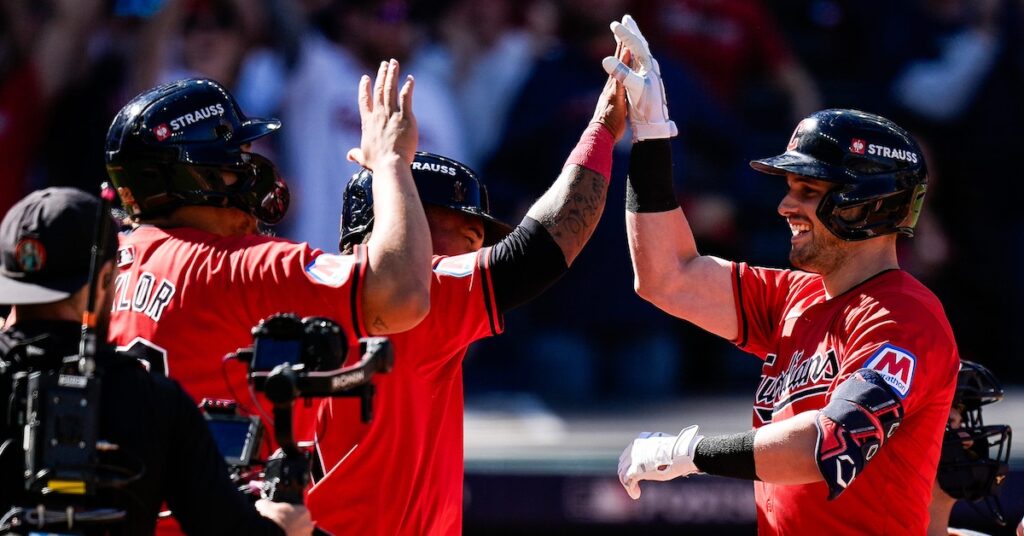
They played nine innings in Cleveland on Saturday afternoon. They really did, a whole baseball game’s worth of innings, but Game 1 of the American League Divisional Series between the Detroit Tigers and the Cleveland Guardians was decided long before all that. The game wasn’t just over after the first inning; it was over before the Tigers had so much as pitched a third of a frame. It’s one of baseball’s quirks that we measure pitching performance in innings pitched, which is to say by the number of outs recorded. There are plenty of stats that make more sense if we use total batters faced as the denominator, and that’s before you think about the occasional outing in which the pitcher doesn’t record an out. Dividing by zero doesn’t really work, and on Saturday, no one was more acutely aware of that bleak mathematical reality than Tyler Holton, Detroit’s starter (or opener, or — maybe more accurately — sacrificial lamb), who had the first no-out outing of his short career.
Last week, A.J. Hinch described his pitching strategy as “Tarik Skubal tomorrow and pitching chaos the rest of the way.” With Skubal lined up to start Game 2, Saturday was a day for chaos. Holton ran a 2.19 ERA over 93 1/3 innings this season, putting up 1.4 WAR. He gave up just five total runs in the second half, and not all of them were earned. But his name didn’t even appear in Jake Mailhot’s series preview. I point that out not to malign Jake, but to emphasize the sheer volume of excellent Tigers relievers that both we and the Guardians need to keep track of in this series. There were so many that Detroit’s Game 1 starter (or opener, or losing pitcher) didn’t even rate a sentence.
One of the more depressing things about chaos theory is that it’s almost entirely devoted to explaining that what looks like chaos is actually just complexity. So much of the randomness, disorder, and inexplicability that we humans find so compelling can actually be explained in mathematical terms that make us want to repeatedly bang our foreheads against the nearest school desk. It’s all about understanding the initial conditions so that you can see how each action affected the system as a whole.
The initial conditions in Cleveland were lovely. It was bright and sunny, 68 degrees at game time. In Tanner Bibee, the Guardians had their ace on the mound, well rested and coming off a September in which he ran a 2.64 ERA. The last time he didn’t leave a game with more strikeouts than innings pitched was August 11. The Tigers, with Skubal lined up to pitch in Game 2 and 5, were starting out with house money. Hinch could organize his chaos just how he liked, and for the second game in a row, he led off with Holton.
Bibee had some ugly misses in the top of the first, letting his fastball sail way above the zone and to his arm side. It could have been nerves, but either way, he was able to locate his slider in the zone. Still, after he struck out Parker Meadows swinging on a changeup, Kerry Carpenter stayed back on a curveball and drove it up the middle for a line drive single, and for a moment it looked like Bibee’s wildness might end up costing Cleveland. Matt Vierling hit a soft chopper to second base for a fielder’s choice, moving Meadows to second, then Bibee hit Riley Greene in the front foot with a curveball, prompting an early mound visit from pitching coach Carl Willis and a brief infield huddle. Whatever Willis said worked just fine. Colt Keith lined out to left field to end the top of the first. It was the last time the Guardians would have anything to worry about.
In the bottom of the inning, Holton started Steven Kwan with sinker off the plate outside. That would be the high point of the day for the Tigers; a 1-0 count on Steven Kwan was as good as it got, the initial condition from which all ensuing calamities cascaded. Kwan ripped Holton’s second pitch, a sinker off the plate inside, off the top of the right field wall for a double, missing a homer by a foot or so. David Fry took Holton to a full count, then fouled off a cutter and a changeup before earning a walk.
With no outs and runners on first and second, superstar José Ramírez came to the plate. Things couldn’t have looked better for Cleveland, but their luck would only improve. Ramírez chopped the ball down the third base line, and the topspin seemed to confuse Zach McKinstry. What looked like a high but routine bounce completely flummoxed him. He just kind of whiffed on it, so handcuffed that he never made a real attempt to catch the ball or even get in front of it. Kwan came around to score on the error, and the Guardians had runners on second and third with no outs.
The Tigers brought their infield in, and their luck didn’t change. The left-handed Josh Naylor rolled over a sweeper, slipping a soft grounder neatly between the first and second basemen to score Fry. That was the end of Holton’s day. He threw 20 pitches and surrendered one hard-hit ball. He allowed three hits, one walk, and one batter to reach on an error. He did not retire a batter.
For the first time all year, Reese Olson entered the game as a reliever instead of a starter. Olson didn’t have Holton’s season, but he still managed a 3.53 ERA and 3.17 FIP over 22 starts, racking up 2.4 WAR in the process. The first postseason pitch of his career was a slider. It was also the first postseason pitch of Lane Thomas’s career. It brings me no joy to report that for the next few days, you will necessarily be hearing the phrase “Lane Train” more often than you would like to hear it, which – and I’m giving you the benefit of the doubt here – is exactly zero times. I’m going to go out on a limb and say that Thomas was sitting slider. He demolished the pitch, launching it 394 feet into left field to make it 5-0.
Remember, the Tigers had yet to record an out at this point. Four of those five runs belonged to Holton, making his ERA for the game four divided by zero times nine.

Olson eventually made his way out of the inning, and then a bunch of people started singing about colon cancer screenings. One of their neighbors was wielding hedge trimmers. He was finishing off a topiary of an anthropomorphic box in which you can mail a stool sample to the company that made the people start singing about their colons. The real CGI box just kind of stood there next to its horticultural doppelgänger, seemingly not at all surprised to be looking into its own eyes, only in the form of a bush. Somehow, it felt of a piece with the baseball that preceded it.
After that, Olson settled down beautifully. He pitched five innings, allowing just two more hits and a walk. Ty Madden would relieve him in the sixth, surrendering two more runs to make it 7-0 Guardians. That’s how the game would end. Despite a few more ugly misses in the early innings, Bibee would cruise through 4 1/3, surrendering just four hits and a walk while striking out six Tigers.
All season, Cleveland’s bullpen has been the opposite of chaos. Stephen Vogt’s crew has been running like clockwork, and that continued in Game 1. Cade Smith followed Bibee, striking out all four batters he faced. Tim Herrin struck out two more in the seventh, Hunter Gaddis worked a clean eighth, and Emmanuel Clase needed just eight pitches to shut the door in the ninth, giving the Guardians the victory and a 1-0 lead in the series.
You could argue that the Tigers needed this game much less than the Guardians. They’ve got Skubal going in Game 2, and he’s lined up for Game 5. They came into the game wanting to win, sure, but also thinking that they’d be happy to steal just one of out of their three potential chaos contests. However, after seeing how that went, the Tigers must be discouraged. Save for one pitch, they wasted a brilliant bulk-relief appearance from Olson, and their offense mustered just four hits while striking out 13 times. If chaos really is just unpredictability that can be unraveled if you math hard enough based on how things start, Detroit might need a new plan.







